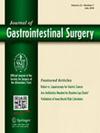术后骨骼肌损失作为胃癌患者临床预后的预后指标:一项系统综述和荟萃分析
IF 2.2
3区 医学
Q3 GASTROENTEROLOGY & HEPATOLOGY
引用次数: 0
摘要
目的:在胃癌(GC)患者围手术期经常观察到骨骼肌质量的减少,并与术后并发症和不良的长期生存结果密切相关。相关研究表明,有一定比例的胃癌患者术后出现骨骼肌质量下降。因此,我们进行了一项系统回顾和荟萃分析,以评估术后骨骼肌损失作为胃癌患者临床结局的预后指标。方法:采用PubMed、Web of Science和Embase数据库,按照严格制定的纳入和排除标准,系统筛选和检索相关研究。我们进一步分析了术后骨骼肌损失对胃癌患者长期生存指标(包括总生存期(OS)、无复发生存期(RFS)、无病生存期(DFS)、疾病特异性生存期(DSS))的影响。结果:从10项研究和11篇相关出版物中,确定了超过3764例GC患者。25.7%的GC患者发生严重的术后骨骼肌损失,并与较差的OS (HR=2.27, 95%CI, 1.58-3.25, p < 0.00001)、RFS (HR=2.96, 95%CI, 1.47-5.97, p=0.002)、DFS (HR=2.41, 95%CI, 1.17-4.97, p=0.02)、DSS (HR=4.12, 95%CI, 2.44-6.94, p < 0.00001)显著相关。当术后骨骼肌损失进展为肌肉减少时,患者的OS也更差(HR=2.22, 95%CI, 1.49 ~ 3.30, p < 0.0001)。结论:接受胃癌根治性手术的患者经常出现骨骼肌质量下降,而骨骼肌质量明显下降与较差的生存结果有关。在随访期间确定骨骼肌质量明显下降的患者,并及时提供量身定制的干预措施,如营养和运动支持,是至关重要的。本文章由计算机程序翻译,如有差异,请以英文原文为准。
Postoperative skeletal muscle loss as a prognostic indicator of clinical outcomes in patients with gastric cancer: a systematic review and meta-analysis
Background
A decrease in skeletal muscle mass is frequently observed during the perioperative period in patients with gastric cancer (GC) and is strongly associated with postoperative complications and poor long-term survival outcomes. Relevant research indicates that a certain proportion of patients with GC experience skeletal muscle mass loss after surgery. Therefore, a systematic review and meta-analysis was conducted to assess postoperative skeletal muscle loss as a prognostic marker for clinical outcomes in patients with GC.
Methods
PubMed, Web of Science, and Embase were used to systematically screen and retrieve relevant studies according to strictly established inclusion and exclusion criteria. Further analysis of the effect of postoperative skeletal muscle loss on long-term survival metrics (including overall survival [OS], recurrence-free survival [RFS], disease-free survival [DFS], and disease-specific survival [DSS]) in patients with GC was performed.
Results’
From 10 studies and 11 related publications, more than 3764 patients with GC were identified. Severe postoperative skeletal muscle loss occurred in 25.7% of patients with GC and was significantly correlated with poorer OS (hazard ratio [HR], 2.27; 95% CI, 1.58–3.25; P <.00001), RFS (HR, 2.96; 95% CI, 1.47–5.97; P =.002), DFS (HR, 2.41; 95% CI, 1.17–4.97; P =.02), and DSS (HR, 4.12; 95% CI, 2.44–6.94; P <.00001). When postoperative skeletal muscle loss advanced to sarcopenia, patients had worse OS as well (HR, 2.22; 95% CI, 1.49–3.30; P <.0001).
Conclusion
Patients who undergo radical surgery for GC often experience skeletal muscle mass loss, and significant skeletal muscle mass loss is associated with poorer survival outcomes. Identifying patients with significant skeletal muscle mass loss during follow-up and promptly providing tailored interventions, such as nutritional and exercise support, are essential.
求助全文
通过发布文献求助,成功后即可免费获取论文全文。
去求助
来源期刊
CiteScore
5.50
自引率
3.10%
发文量
319
审稿时长
2 months
期刊介绍:
The Journal of Gastrointestinal Surgery is a scholarly, peer-reviewed journal that updates the surgeon on the latest developments in gastrointestinal surgery. The journal includes original articles on surgery of the digestive tract; gastrointestinal images; "How I Do It" articles, subject reviews, book reports, editorial columns, the SSAT Presidential Address, articles by a guest orator, symposia, letters, results of conferences and more. This is the official publication of the Society for Surgery of the Alimentary Tract. The journal functions as an outstanding forum for continuing education in surgery and diseases of the gastrointestinal tract.

 求助内容:
求助内容: 应助结果提醒方式:
应助结果提醒方式:


